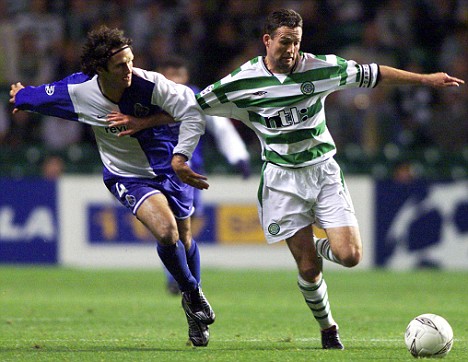
INVINCIBLES
WHY SCOTTISH FOOTBALL REBUILT, TOP TO TOE
As last season developed, and Celtic progressed towards a treble that increasingly looked like it would be achieved without losing a game, the discussion in some parts of the media moved towards whether it was healthy for Scottish football to have one team so dominant. The premise of this argument is reasonably understandable, that for an elite professional sport in Scotland, with 42 clubs, to have one team infinitely superior to the rest reflects poorly on the overall health of the sport.
This argument has some merit and what this debate should have done is prompt a review of the strategies of the SFA and the SPFL (and their predecessors) over the last 25 years; a period that has seen the year on year decline of the Scotland national side’s standing in World football and the year on year decline of a club’s performances in European competition. It should have led to a wider debate about a league structure that has contributed to this fall in standards. It should have led to a debate about the standard and number of coaches at professional and youth levels throughout our game. It should have led to a debate about the positions of Neil Doncaster and Stewart Regan in overseeing our demise.
It didn’t.
It should have led to a review and an appreciation of what Celtic were doing correctly and how that could be translated across our sport.
It didn’t.
Instead of holding up Celtic as an exemplar and of delighting in the achievement of excellence, the tone of much of the press coverage as Celtic approached the climax of the invincible season was about how bad Celtic were for our game; not how good having excellence in our game was, and how a new bar and standard of excellence had been set.
Regular listeners to the podcast will know that I was furious at the tone of this coverage. In what of a walk of life would people be referencing the existence of excellence in terms of a negative? Would a teacher bemoan a new student coming into their class and setting higher standards for the students to follow? Do we bemoan the setting of new world records in athletics or swimming to raise the standards of excellence at the next Olympics or European Championships? Would an employer complain when a new member of staff undertakes tasks quicker, better, or more accurately?
No. Only in the bonkers world of Scottish football do we bemoan excellence and wish to have the better athletes brought down to a lower level.
Once the season was over and Celtic had achieved the treble, and had done so without losing a single domestic game, we had more criticism of their success by the president of the SFA! Instead of a debate about how, in the cup final, Aberdeen illustrated that in order to compete with the best they needed to be 30 to 40 minutes fitter, we had a debate about why it was not good for Scottish football that Celtic was so good. Indeed we have had more criticism from the SFA of Celtic winning the treble without losing a game than we have of Rangers winning 14 trophies through unlawful and illegal tax evasion.
Over the last 25 years the performance of the Scottish national side has declined to the point where no one expects qualification for major championships and the performances of the lesser club sides such as St Johnstone and New Rangers within European competition have declined so rapidly that getting a Scottish side passed the first qualifying round is perceived as an achievement but it would not be expected that any side other than Celtic would reach the group stage of the Europa League.
During this slide to mediocrity and below Celtic have remained the one shining light; but instead of looking at the Celtic model as a level of excellence to attain, the discussion has revolved around why Celtic’s achievements should not be recognised as a good.
As stated above, I understand what lies behind this message. It is a concept that one side being infinitely superior to the rest reflects poorly on the rest. It is therefore the rest that should be targeting in this discussion.
There should be no debate about Celtic’s achievements and how fantastic they are, there should only be discussion about how the rest can come to Celtic’s level. Regular readers and listeners to the podcast will know my admiration for authors, such as Carol Dweck, and those who discuss the Growth Mindset. In aspiring to excellence the use of positive, encouraging language is essential. This does not mean ignoring the truth of the abysmal failure that is a cancer eating at the heart of our game. It is why a full and thorough review of every aspect of Scottish football is required.
The cheating of Glasgow Rangers, from the start of this century until they went bust, is one of the key symptoms of the cancer that has led to the dire position of our game. Celtic did not achieve excellence by financial doping or cheating. Celtic achieved excellence through sleeves rolled up hard work, through elbow grease, through perspiration and aspiration. The foundations for their structure were set by sound, prudent financial management and it is this prudent financial management, allied to hard work on the training park, that should be set as the Exemplar model that the review of the Scottish game should look at in the implementation of a new model going forward. The existing process has failed and we need to have a complete and utter revamp. A thorough review of our game from top to toe is required. The people who have overseen this abject failure must leave and must have no participation in that review. That review should also consider the lack of support provided by the government in assisting our premiere sport to achieve excellence on the national stage.
Celtic are the standard bearers in Scottish football. They are the level that the rest of our game should aspire to. At the professional level, football is an elite sport. Community clubs should be allowed to find their own level. The league structure should be created to channel the best possible funds to those clubs who want to achieve excellence and want to add value to the national game. Real achievable goals for the national side should be set. Real achievable goals for the club sides should be set. There should be time periods within which these goals will be set {i.e. the national side achieving qualification for the European Championships within X years. The national side achieving qualification for the World Cup within Y years.}. There should be hard but achievable targets set for our club sides {i.e. our elites teams reaching last 16 of Champions League within X years, our elite teams reaching Europa League group stages so many times within Y years}. If these targets are not achieved within the requisite time table, there needs to be a review programme built into the process for changing the setup.
There has been a malaise within the bulk of our game our game for 25 to 30 years; from the authorities who have overseen this downturn to the fans of many clubs who accept the European failures of clubs other than Celtic. The rest of European and world football has passed us by whilst we have stood still. We have had think tanks and discussion, but no root and branch changes.
Instead of criticising the best, it’s time to start criticising the rest.



